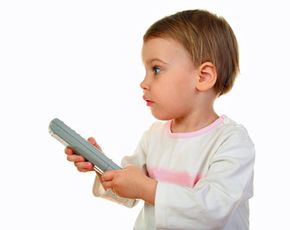The effect of television on children, especially on babies, is an intensely controversial subject. Every year rafts of studies and statistics appear about children's television habits, and some of them may seem alarming.
The average American child watches about four hours of television a day [Source: AAP], while 20 percent of children under 2 have televisions in their rooms. Among babies 3 months old and younger, 40 percent watch TV, with the percentage increasing significantly for children age 2 and younger [Source: Seattle Post-Intelligencer]. A study in 2003 found that children 6 months to 6 years old spend an average of two hours a day dealing with "screen media" like televisions, computers and video games [Source: CBS News]. The study also revealed a correlation between time spent watching television and difficulty reading.
Advertisement
Many of these studies have led doctors, educators and other experts to recommend curbing a child's TV consumption. The campaign received another shot in the arm when a study released in early August 2007 showed that baby-oriented video programs like "Baby Einstein" and "Brainy Baby" may harm child development. These videos, which are widely available on VHS and DVD, contain little dialogue, instead relying on juxtaposed images that frequently aren't related to one another or are difficult to explain. (The study cites lava lamps as one example of an image or concept that's hard to explain to a baby.) But the videos are tremendously popular: The "Baby Einstein" series has earned more than $500 million in revenue [Source: Boston Globe] and Disney purchased the company in 2001 [Source: Denver Post].
Many parents say that they use these videos like babysitters, turning on a "Baby Einstein" DVD for their children so that mom and dad can clean up the house, prepare dinner or take care of other chores. But the problem, researchers say, is that these videos don't provide the benefits they claim, and they may even do harm.
The problem lies not only in the videos' content -- little dialogue or interactivity and rapidly changing images -- but also with how babies' brains develop. A child's brain is very sensitive before age 2. It's still developing neural connections and growing in size. Because of this sensitivity, it's important for babies to have a lot of interactive stimulation to learn and develop. The researchers contend that the videos don't provide this stimulation.
The study, which was published in the Journal of Pediatrics, looked at 1,000 families, examining children who were 8 months to 16 months old. Thirty-two percent of children surveyed watched the videos, 17 percent of them for at least an hour a day. To determine how programs like "Baby Einstein" affected development, they focused on vocabulary. On average, for every hour a day a child watched these programs he or she knew six to eight fewer words compared to children of the same age. Children who were 17 months to 24 months old didn't seem affected by the program in any way.
The head of the study, Frederick Zimmerman of the University of Washington, said that "there is no clear evidence of a benefit coming from baby DVDs and videos, and there is some suggestion of harm" [Source: Forbes].
So should all TV-viewing be forbidden for young children? On the next page, we'll look at what else the researchers had to say and what some experts recommend for babies watching TV.
Advertisement


